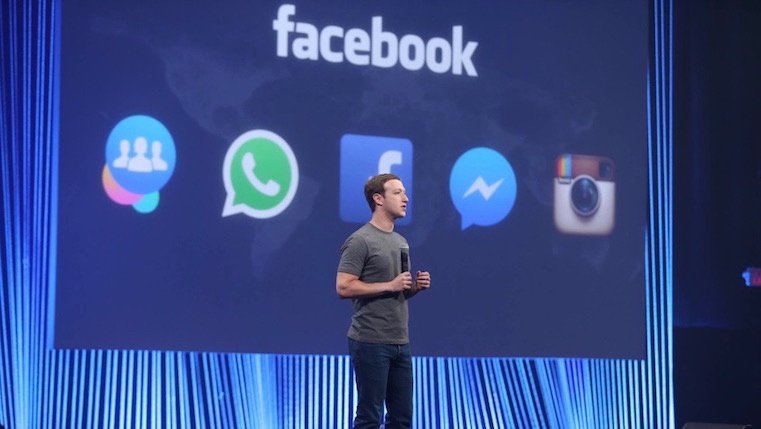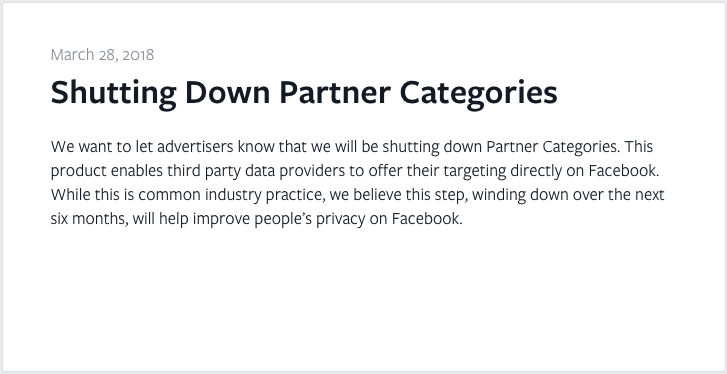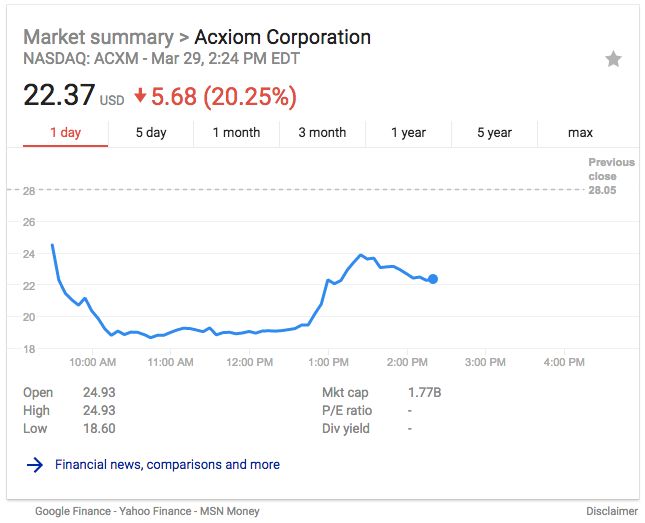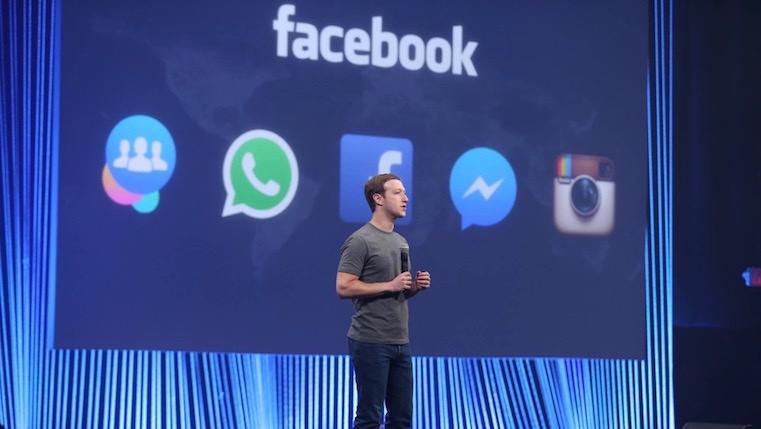Facebook announced yesterday that it will be shuttering Partner Categories: the product that allows third-party data providers to supplement advertisers with targeting information directly through Facebook. Where Facebook Advertisers Get Their Data Prior to these recent changes, advertisers on Facebook had a few primary sources of user data that they could use for targeting purposes, including data that Facebook itself has from what users provide on their profiles, as well as their activity on the network. These companies possess and provide advertisers with data that are often based on non-social-media activities, like shopping history and income -- which is part of what Angwin and her team discovered when ProPublica started investigating the breadth of Facebook user data in 2016. And again, as Facebook said itself, these practices are not limited to Facebook advertisers, and are frequently promoted as a value-add by some of the larger data providers involved, like Experian and Acxiom. It's no secret, then, that providing these services is a source of revenue for the data providers, too. Source: Google What This Means for Marketers But how much do advertisers stand to lose from these changes? Here's a page from my own file with some of the "interest" data Facebook uses to help target ads: That data isn't exactly minuscule, and some advertisers could still be able to effectively reach audiences with it. Why Is Facebook Doing This? Here's the thing about the user data in Facebook's possession (the kind that's used within its own targeting tools): Most people don't really want advertisers to have direct access to that information in a way that attaches it to specific people. Facebook isn't alone in its recent onslaught of privacy and other policy changes.

Facebook announced yesterday that it will be shuttering Partner Categories: the product that allows third-party data providers to supplement advertisers with targeting information directly through Facebook.
In the announcement, Facebook noted that “this is common industry practice,” but will still shutter the product to “help improve people’s privacy on Facebook.”

For Facebook and marketers alike, the announcement is what ProPublica reporter Julia Angwin called “a big deal.” Here’s what’s going on — and why it matters.
Where Facebook Advertisers Get Their Data
Prior to these recent changes, advertisers on Facebook had a few primary sources of user data that they could use for targeting purposes, including data that Facebook itself has from what users provide on their profiles, as well as their activity on the network. It’s not entirely unlike what’s available in your downloadable Facebook data archive file, which I wrote about here.
That data could be used in combination with other sources of information that the advertiser might have on its own, like email contacts or survey responses.
Finally, there are the third-party data providers, which are the ones Facebook has severed ties with. These companies possess and provide advertisers with data that are often based on non-social-media activities, like shopping history and income — which is part of what Angwin and her team discovered when ProPublica started investigating the breadth of Facebook user data in 2016.
We also found that 600 of the 29,000 categories Facebook offered to advertisers were from data brokers. They were extremely specific and often financial, such as income between $100k and $125k or frequent shopper at dollar stores. /6https://t.co/S4Yo2nEa1T
— Julia Angwin (@JuliaAngwin) March 29, 2018
The data from these providers are often synthesized in tandem with information that Facebook has from user profiles, helping to match (or target) promoted content to the most relevant audiences. It’s a powerful combination that could be at least partially responsible for Facebook’s growth as a valuable advertising platform — to the point where 98% of its 2017 global revenue was rooted in advertising.
And again, as Facebook said itself, these practices are not limited to Facebook advertisers, and are frequently promoted as a value-add by some of the larger data providers involved, like Experian and Acxiom. The latter calls it a “data package” that can help advertisers “accurately identify relevant audiences for all of your media campaigns.”
It’s no secret, then, that providing these services is a source of revenue for the data providers, too. According to the Wall Street Journal, Acxiom stands to lose $25 million in fiscal 2019 revenue and profit. And while it seems possible for advertisers to still independently enlist these third-party services, a barrier to access is now in place that was previously removed by direct data availability through Facebook.


COMMENTS